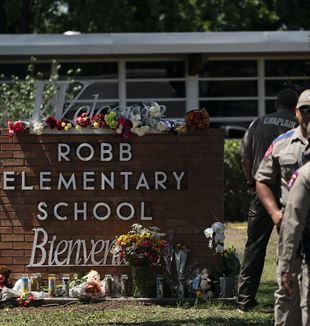
Hope in the Face of Tragedy
Facing the recent tragedies, Dawn reflects on her experience as a survivor of the Sandy Hook School shooting.Nine years, 5 months, and ten days after the the tragedy at Sandy Hook School in Newtown, CT, when 20 children and 6 educators were killed in a mass shooting at an elementary school, another tragedy, eerily similar in nature, occured in Uvalde, Texas, where 19 children and 2 educators were slain in yet another mass shooting. And while there have been far too many mass shootings in between these two, the similarities to the recent one at Robb Elementary School to my own experience as a survivor of the Sandy Hook School shooting shook me to the core.
First and foremost, I grieve for the families, friends, and community members of those who perished at Robb Elementary School on May 24, and I pray for their healing and for an eventual sense of peace in their hearts. I realize that this may sound like an impossibility - especially now, but even in the future. However, it is possible and attainable, because there is hope.
The road to healing is long, and is not straight. For days following the shooting I cried, both day and night. I even remember waking up crying for days in a row. We grieved as a school community, as a town, and literally the whole world grieved with us. This was evident from the outpouring of letters and cards sent to our school and to our town - tens of thousands of letters that filled bins in a room at the town hall - offering prayers and well wishes.
School closed early for our winter break, as we attended funeral after funeral - sometimes more than one in a single day. But after the first of the year, it was time to return to school. We didn’t return to our Sandy Hook School, but to a temporary location in a neighboring town, who loaned us the use of a school that was empty, until our school could be rebuilt.
The return to school was difficult. We were teachers, not social workers or therapists, and although we were coached on how to handle students’ questions or fears (mostly by connecting them with the support staff that was available to both children and adults), it was completely unchartered territory. We tried our best to get back to “business as usual” when something far from usual had occurred. We didn’t talk about the event with students, however if anyone did want to talk, we got them the help they needed. For the most part, I agreed with this method. I agreed that if we continued to learn math and reading and writing, like you’re supposed to do when you’re at school, it would begin to once again feel normal and even safe to be there (something we all used to take for granted).
Relationships with my friends and colleagues at work were different. From the beginning, we clung to each other fiercely. We hugged all the time, constantly checked in with each other, and fiercely defended each other and protected each other’s tender hearts. We all recognized that people grieve in different ways, heal at different paces, and react to trauma differently. However, while intellectually knowing these things, and making gallant efforts at respecting each other's differences, relationships became strained, at times.
Some people were angry and clung to the injustice of the event. Some used their anger in productive ways and quickly became activists fighting for stricter, common-sense gun laws. And while I applaud and support these efforts, I did not become an activist.
My journey of healing felt more internal, yet it was fueled by external forces. I was supported by my family and friends, who made me feel loved and cared for. And I was struck by the efforts of strangers who were moved to immediate action - the cards and letters I mentioned earlier, gifts that filled a gymnasium, artwork and signs that lined our streets - including the streets leading to our new temporary school - offering messages of caring and hope, and prayers.
These things moved me deeply, and continue to give me hope, because they demonstrate, as Saint Josemaria Escriva describes, “the action of grace in our souls, our love for our neighbor as a result of our love for God.”
Dawn, Newtown, CT